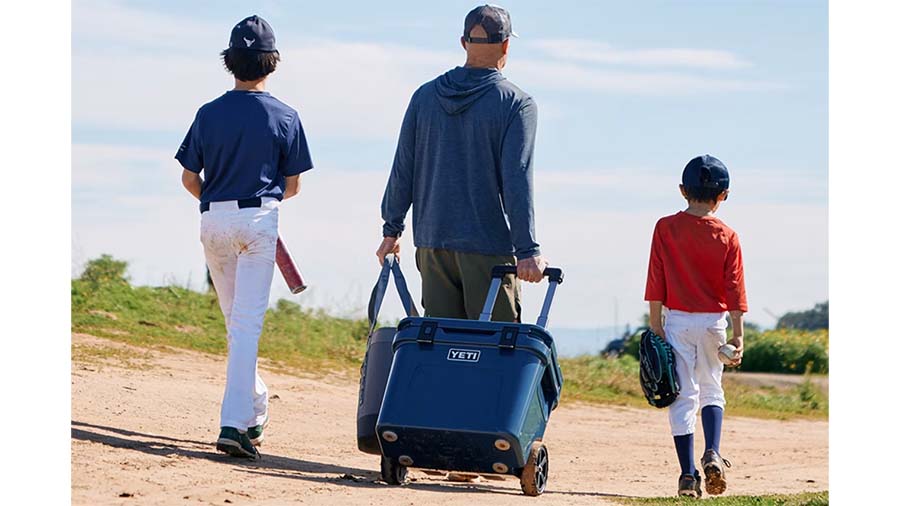Shares of Yeti, Inc. jumped about 11 percent Thursday after the company reported that lower freight and product costs drove first-quarter earnings well above Wall Street targets, leading to raised EPS guidance for the year. Sales grew by double-digits for the second consecutive quarter.
“We saw positive global demand for our brand and our broadening range of products and we had great execution across multiple fronts, driving double-digit growth in both our wholesale and DTC channels as well as our Coolers & Equipment and Drinkware categories,” said Matt Reintjes, president and CEO, on quarterly call with analysts. “Our wholesale performance was supported by sell-in and sell-through relative to the year ago period, while our DTC business showed continued growth across e-commerce, corporate sales, Amazon and Yeti retail.”
By geography, international growth exceeded 30 percent year-over-year to reach a high of 19 percent of total sales, even as domestic growth was nearly 10 percent. Yeti maintained its guidance for sales for the year while increasing its EPS guidance due to reflect our margin strength and the execution of an accelerated share repurchase program.
In the quarter ended March 31, sales improved 13 percent to $341.39 million, topping analysts’ consensus estimate of $333.81 million.
By category, Coolers & Equipment sales increased 15 percent to $119.9 million, compared to $104.4 million in the same period last year, driven by strong performance in bags, soft coolers, and hard coolers.
Drinkware sales gained 13 percent to $214.6 million due to the continued expansion and innovation of its Drinkware product offerings and new seasonal colorways.
By channel, Wholesale sales increased 13 percent to 153.6 million due to due to growth in both Coolers & Equipment and Drinkware. Direct-to-consumer net sales increased 12 percent to $187.8 million due to growth in both Drinkware and Coolers & Equipment.
Gross margins improved 360 basis points to 57.1 percent due to lower inbound freight costs and lower product costs. On an adjusted basis, gross margins expanded 450 basis points to 57.5 percent.
SG&A expenses increased 15 percent to $169.0 million and increased 100 basis points as a percent of sales to 49.5 percent. The increase was primarily due to higher employee costs and marketing expenses, partially offset by lower warehousing costs. Adjusted SG&A expenses increased 13 percent to $156.8 million, or flat as a percent of sales at 45.9 percent.
Operating income jumped 71.0 percent to $25.8 million. Adjusted operating income gained 82 percent to $39.6 million.
Net income advanced 50 percent to $15.9 million, 18 cents a share, from $10.6 million, or 12 cents, a year ago. Adjusted net income surged 89 percent to $29.3 million, or 34 cents, from compared to $15.5 million, or 5.1 percent of adjusted sales in the prior year quarter; Adjusted net income per diluted share increased 89 percent to $0.34, compared to $0.18 per diluted share in the prior year quarter. Results easily topped analysts’ consensus estimate of 24 cents.
On product, Reintjes said Yeti is focused on three key themes this year: a focus on growth in its cooler family, the evolution of Yeti into broader food and beverage, and the product expansion potential under the Yeti brand umbrella and brand-building playbook.
“Across our product range, we’re in a great position to capitalize on the warmer weather in the beginning of summer travel and outdoor activities,” said Reintjes. “We’re leveraging a few key demand drivers as we head into the season: innovation, awareness and conversion.”
In hard coolers, Yeti recently debuted the Roadie 32-cooler, its smallest and most portable wheel cooler to date. Said Reintjes, “The Roadie was designed to pull up to a camp site, move through a tailgate or handle weekend tournaments.”
Later this summer, a personal-sized hard cooler will be introduced to anchor at the entry price point for Yeti hard coolers at $200. Said Reintjes, “Think of this as a good day out type cooler that will work well in a side-by-side on a golf cart or on the job.”
On the Drinkware side, Yeti is “seeing a great response to our deep portfolio of 50-plus offerings across our premium range of bottles and tumblers. This is part of our growth and expansion strategy as we support more moments in their day. We are evolving this category and building out solutions to address what we see as consumer needs and opportunities.”
For instance, Yeti recently introduced a french press and pitcher complement to build on the success of last year’s beverage bucket and wine chiller. Additionally, after years of requests from customers, barware items will launch in limited supply and time for Father’s Day.
To round out its 2024 offerings, Yeti plans to introduce its first Yeti cast iron cookware later this summer. Outside of Coolers and Drinkware, Reintjes said Yeti is also “excited by the prospects of what we see as possible in bags, cargo and the expanding group of offerings under our Coolers & Equipment family.”
He said Yeti started its bag expansion with its flagship dry bag expansion earlier this year, following last year’s addition of new waterproof dustproof cargo boxes. The push into cast iron cookware and bags is being supported by its recent acquisitions of Mystery Ranch and Butter Pat. Reintjes said, “Our integration of these businesses is on track as we accelerate our mid- and long-term opportunities in bags and cookware.”
Elaborating on Yeti’s channel performance, Reintjes said DTC operations saw the benefits of customer value in units per transaction against “some more challenging traffic and customer count” as the brand lapped the start of last year’s recall and its selected end-of-life transitions.
“Our Amazon marketplace remained consistently strong as we see that customer loyalty to the channel, further supporting our strategy of diverse channels to market,” said Reintjes. “Corporate sales delivered strong order volume and inbound demand.”
Yeti stores opened in the Woodlands outside of Houston, TX and in New York City’s Flatiron District. Said Reintjes, “Our stores continue to provide a singularly unique opportunity to see the depth and breadth of Yeti’s product offering, engage with product experts, learn and shop.” Yeti is targeting the opening of six locations this year, including upcoming openings in Kansas City and Calgary which would bring its fleet total to 24.
In the wholesale channel, positive demand was seen across categories, further supported by better sell-in compared to last year’s period. Said Reintjes, “Channel inventory is in good shape, as our partners continue to lean into seasonal colors and remain bullish on product releases we have planned throughout 2024 and into 2025.”
Reintjes added that Yeti continues to focus on “thoughtfully expanding our global wholesale reach,” including the previously announced move to start selling to Tractor Supply in the U.S., combined with new partners in Canada, Australia and Europe. Relatedly Reintjes noted that Yeti recently hired Naoji Takeda, formerly at Keen, as new managing director, Asia, to support growth in Japan and Asia.
Outlook
For Fiscal 2024, Yeti expects:
- Adjusted sales to increase between 7 percent and 9 percent (consistent with previous outlook);
- Adjusted operating income as a percentage of adjusted sales between 16.0 percent and 16.5 percent (versus previous outlook of approximately 16.0 percent);
- Adjusted net income per diluted share between $2.49 and $2.62 (versus previous outlook of between $2.45 and $2.50), reflecting an 11 percent to 16 percent increase;
- Capital expenditures of approximately $60 million primarily to support investments in technology and new product innovation.
Image courtesy Yeti
















